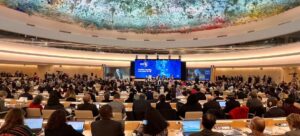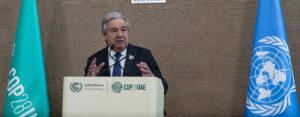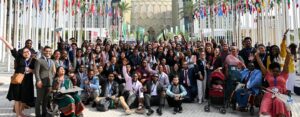“This is a pivotal day. We are here to rebuild a foundation of hope – hope that we need now, perhaps more than ever, at this sombre moment in history,” Volker Türk, UN High Commissioner for Human Rights said, addressing participants which included leaders from Poland, Slovenia, Estonia, Greece Senegal, Colombia and the Maldives, taking to the stage.
Highlighting unprecedented challenges, Mr. Türk emphasized the need for unity and hope in the face of growing disorder, division, geopolitical complexities, deepening inequalities, and fear.
Trust in freefall
“Trust – in each other, and in the institutions that guide us – is in freefall,” he warned, pointing out suffering in conflict zones, including the Occupied Palestinian Territory, Israel, Ukraine, Sudan, Myanmar, and other regions where civilians endure the brunt of intractable and brutal conflicts.
He warned again backtracking on the Sustainable Development Agenda, the silencing of voices in the public square, and the urgency of the climate crisis.
“These and other crises are the consequence of the failure to uphold human rights. They are not the failure of human rights; they bear witness to the damage that is done when human rights are ignored and violated,” the High Commissioner asserted.
Mr. Türk expressed gratitude for the ‘transformative promises’ made by over 155 states, focusing on human rights issues such as women’s rights, children’s rights, climate change, and empowerment of people with disabilities. He called on world leaders to shift perspectives to make human rights central to policymaking and action.
Duty to advance human rights
“Human rights is a global public good – and as leaders, you are entrusted with the duty of advancing it,” Mr. Türk said, outlining four key areas that require immediate attention: peace and security, digital transformation, human rights-infused economies, and placing human rights at the centre of environmental policy.

He called on leaders to come together, ‘transcending different societies and systems’, to seek areas of agreement and ensure meaningful change. Mr. Türk reminded them of the role their forebears played 75 years ago when they set the foundations for freedom, justice, and peace through the UDHR.
“It is our turn now to take on this profound and visionary task of ensuring that human rights become both the overarching goal and the guardrails,” Türk said. “Human rights principles are our best solution to this fraught and frightened world. I entreat you to rekindle the spirit, impulse, and vitality that led to the Universal Declaration 75 years ago.”
Applicable to all
Leaders also took part in four roundtable discussions.
“Human rights are universal, universally applicable to every person. They do not need to be proven or additionally granted in any way,” Andrzej Duda, President of Poland, whose country has provided assistance to over 950,000 Ukrainians since Russia’s full-scale invasion of their country, told the members of the panel addressing the Future of Human Rights and Peace and Security.
UNHumanRights
Speaking at the same meeting, Minister of Foreign Affairs of the observer State of Palestine Riyad Al-Maliki said: “There are many dark ironies in our discussions today, not the least of which is that I represent the people whose fundamental rights to life, to dignity and to self-determination among many others have been denied for 75 years”.
“When human rights are not universal, this declaration and all the progress we thought we achieved over the decades, become irrelevant and unconvincing,” he added, calling for human rights to be defended everywhere, without exception.
Foundation for progress
“Innovation must reflect universal human values. While contributing towards the protection of our planet and the attainment of the Sustainable Development Goals” said the President of Slovenia, Nataša Pirc Musar, at the roundtable on the Future of Human Rights and Digital Technologies.
“AI has immense potential for our economies, societies and the planet,” she added, encouraging countries to invest more in solving societal problems and shared global challenges when it comes to digital technology.
The session discussed how artificial intelligence, surveillance technology, social media platforms and a host of other new and emerging technologies could be used to ensure that human rights are central to the way tech is developed, used, and governed, including through recent UN initiatives.
A session on Human Rights, Development and the Economy, focused on securing the rights to food, health, education, water and sanitation for millions worldwide.
And as negotiations over the final declaration continued in Dubai at COP28, with environmental campaigners and many States calling for a fossil fuels phase-out, the fourth roundtable discussed the massive impacts that the cumulative crisis of climate change, biodiversity loss and pollution is having on the enjoyment of all human rights.
Participants considered ways to advance human rights in the context of the environmental emergency, improving accountability, securing a just transition and protecting environmental rights defenders.














